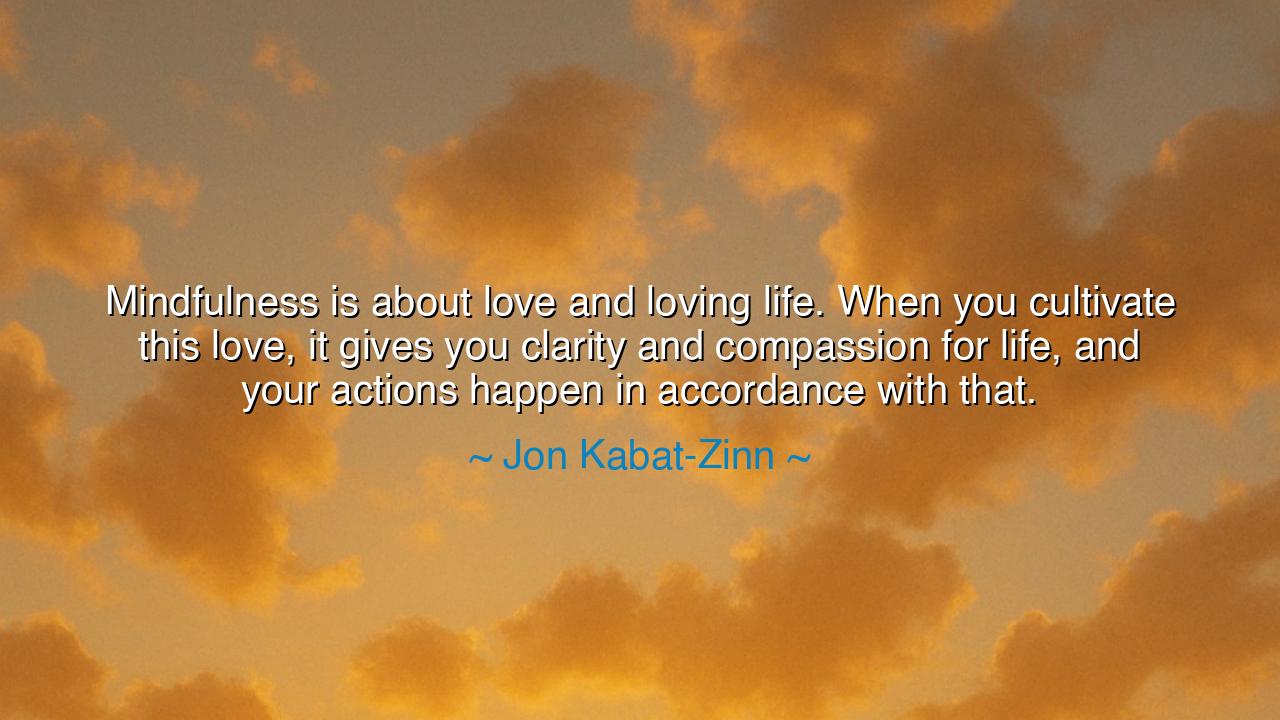
Mindfulness is about love and loving life. When you cultivate
Mindfulness is about love and loving life. When you cultivate this love, it gives you clarity and compassion for life, and your actions happen in accordance with that.






“Mindfulness is about love and loving life. When you cultivate this love, it gives you clarity and compassion for life, and your actions happen in accordance with that.” Thus spoke Jon Kabat-Zinn, the modern sage who brought the wisdom of mindfulness from the monasteries of the East to the hurried hearts of the West. In these words, he reminds us that mindfulness — often mistaken as a mere exercise of attention — is, in truth, a sacred act of love. To be mindful is not simply to observe the world, but to embrace it. It is to look upon the present moment as one would upon a beloved — with tenderness, curiosity, and reverence. For when the heart awakens to love, perception clears, and compassion flows like a river unbroken.
To understand his teaching, one must remember the soil from which it grew. Jon Kabat-Zinn was not born in a temple, but in a world of science and skepticism. Yet he saw that the ailments of modern man — anxiety, alienation, and restlessness — did not arise from lack of knowledge, but from forgetfulness. Humanity had forgotten how to be present, how to dwell in the miracle of existence. Through the ancient practices of Buddhist mindfulness, he rediscovered what the Buddha himself had taught under the Bodhi tree: that to live fully is to be aware with love. Awareness without love is cold observation; love without awareness is blind attachment. But when the two unite, the soul awakens, and life reveals its sacred clarity.
In this union of love and awareness, we find the secret of clarity and compassion. When one cultivates mindfulness, one learns to see without judgment — to look upon both joy and suffering with the same steady gaze. And in that gaze arises understanding. To see life clearly is to realize that all beings are woven together in a single fabric of experience. From this understanding grows compassion — not the soft pity of sentiment, but the fierce tenderness of one who knows the pain of others as his own. Thus, mindfulness becomes not a retreat from the world, but an entry into it — a way of acting with love, rather than reacting with fear.
The ancients, too, knew this truth. The philosopher Marcus Aurelius, emperor of Rome, practiced a form of mindfulness long before the word was known. Amid wars and burdens of empire, he wrote, “Love only that which happens to you, for it was woven for you by nature.” Even upon the throne, he sought not escape, but presence — not control, but acceptance. Like Kabat-Zinn, he understood that clarity and peace come not from changing the world, but from loving it as it is. And in that love, action becomes pure. The just ruler, the compassionate healer, the wise teacher — all act not from ego, but from harmony with the rhythm of life.
Consider also the story of Thích Nhất Hạnh, the Vietnamese monk and peace activist who taught that mindfulness can stop wars. In the midst of conflict, he encouraged people to breathe, to walk slowly, to touch the earth with awareness. When he met soldiers and refugees alike, he did not speak of politics, but of presence — of loving life, even amid suffering. His calmness, born of love, became a bridge where anger could not. Like Jon Kabat-Zinn after him, Thích Nhất Hạnh showed that mindfulness is not escape from life, but the deepest engagement with it. It transforms not by force, but by the gentle strength of understanding.
And so, Kabat-Zinn’s words teach that love is both the root and the fruit of mindfulness. When you cultivate awareness of the present — the breath, the body, the world around you — you are cultivating love itself. Love for this fragile moment, love for the fleeting gift of being alive. From that love arises clarity — the ability to see the truth without distortion — and from clarity arises compassion, the natural wish to alleviate suffering, to act with kindness, to live in alignment with what is good and true. Actions born from love are effortless, for they flow not from will, but from the deep current of being.
So, my child, remember this: to be mindful is to love, and to love is to be awake. When you rise each morning, breathe with awareness. Feel the gift of air entering your body. Look upon the faces of others not as strangers, but as reflections of your own spirit. Let every act, no matter how small, be done with care — for mindfulness sanctifies even the ordinary. When you wash your hands, wash the world; when you speak, speak gently, for every word touches another heart.
And when pain comes — as it always does — do not turn away. Sit with it. Breathe with it. Love it, too, for it is part of life’s vastness. In that moment of acceptance, you will glimpse what Kabat-Zinn calls clarity and compassion — the still, luminous heart that sees all and condemns nothing. From that stillness, right action will arise naturally, as flowers bloom toward the sun. This is the way of mindfulness, and this is the way of love — not a philosophy of escape, but a practice of presence, where every breath becomes a prayer, and every heartbeat an act of gratitude for the miracle of being alive.






AAdministratorAdministrator
Welcome, honored guests. Please leave a comment, we will respond soon